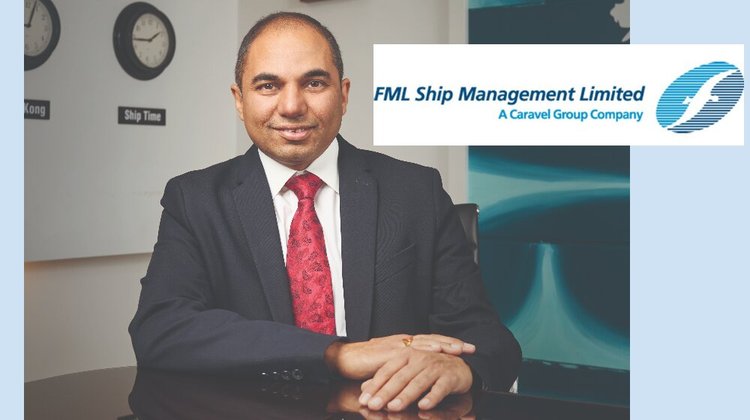Capt. Rohit Tandon: The possibilities in the maritime industry are endless
07:20 - 14 June 2023

Capt. Rohit Tandon, General Manager, Head, Marine Department, FML Ship Management Ltd talks about how the maritime industry is embracing digital transformation and more.
Shipping has been slower than most other industries to implement major technological changes. Why is this? Are there still cultural barriers in the way of digital transformation in the maritime sector?
One of the primary factors is the conservative nature of the industry, which prioritises reliability and safety over innovation. Additionally, the high cost of implementing new technologies and the complex regulatory environment can act as barriers to entry for smaller companies. Cultural barriers also play a role in hindering digital transformation in the maritime sector. The industry is traditionally hierarchical and relies heavily on face-to-face communication, which can make it challenging to embrace new digital communication tools. Moreover, there is often a lack of digital literacy among the older workforce, which can make it difficult to adopt new technologies. However, the industry is gradually beginning to embrace digital transformation, with the growing awareness of its benefits such as improved efficiency, cost savings, and reduced environmental impact. The COVID-19 pandemic has also accelerated the adoption of digital tools in the industry, as remote work and contactless operations have become the norm.
What practical steps have you taken to adopt digital solutions? How much progress has your company made on its digital transformation journey?
At FML, digital transformation is not a new phenomenon. For the past two decades, we have operated PARIS, an award-winning ERP platform. The next generation, PARIS 2.0, is a digital ecosystem that we have built in-house to integrate seamlessly digital technology and data analytics into our existing ship management operations. The SafeView App, a digitised vessel inspection reporting capability that we have developed, is fully integrated with the PARIS 2.0 ecosystem. Soon we are going to roll out our new NOVA platform, which is currently in the pilot phase. NOVA is part of the PARIS 2.0 ecosystem for analytics and will provide insights. The core platform of NOVA is fully integrated with our common PARIS 2.0 services. Apart from vessel performance and monitoring data such as emissions and fuel consumption, we have also integrated NOVA Navigation, powered by Wartsila FOS, enabling insights into navigational elements. NOVA has the capability to provide an ever-growing range of data insights, utilising machine learning to provide predictive capabilities.
As satellite connectivity improves and spreads, bringing 5G networks, edge computing and more to ships, what new technologies might we see onboard? Which one excites you the most?
New technologies could include autonomous navigation systems, advanced safety and security systems, predictive maintenance systems and more. However, the technology that excites me the most is augmented reality (AR) and virtual reality (VR) applications on ships. These technologies could be used for crew training, remote assistance, and even to enhance the passenger experience. For example, passengers could use AR/VR headsets to explore the ship, play immersive games, or experience virtual tours of destinations. Overall, the possibilities are endless, and we can expect to see exciting innovations in the maritime industry in the coming years.
The downside of greater digitalisation is increased cybersecurity risk. How vulnerable is the shipping industry to cyberattacks? Which practices and technologies can be adopted to mitigate this risk?
The shipping industry is increasingly vulnerable to cyberattacks due to its reliance on interconnected digital systems, including those controlling navigation, cargo management and communication. Recently, high-profile attacks on shipping companies have highlighted the potential for significant disruptions, financial losses, and safety risks. The shipping industry can adopt a range of practices and technologies to mitigate these risks, including the provision of regular employee training on cybersecurity best practices, implementing strict access controls and network segmentation, adopting robust encryption and data protection measures, and deploying advanced threat detection and response technologies. Additionally, companies can be certified to ISO 27001 (Information Security Management System) – Class DNV has certified us for the past five years.
With artificial intelligence (AI) fast becoming more capable, greater onboard automation is inevitable. How do you expect AI to change the role of the seafarer and, by extension, the traditional infrastructure of the entire industry?
Firstly, AI could potentially lead to a reduction in the number of crew required to operate a vessel, as more tasks become automated. Secondly, seafarers may need to develop new skills to work alongside and manage AI systems, and there may be a greater emphasis on digital literacy and data analysis. Additionally, there may be a shift to more remote monitoring and control of ships, which could lead to changes in the traditional infrastructure of the industry. However, it is important to note that the full extent of these changes will depend on a range of factors, including the development of technology, regulatory frameworks and wider economic trends.
This interview first appeared in the May edition of GOLD magazine. Click here to view it.

